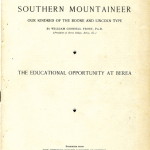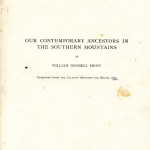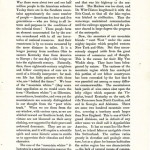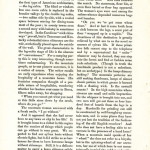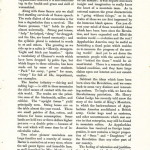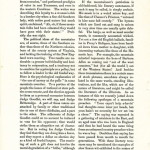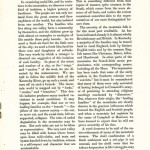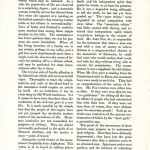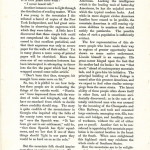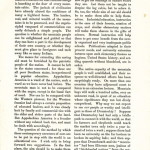Pine Mountain Settlement School
Series 27: Scrapbooks
SCRAPBOOK BEFORE 1929: William Goodell Frost – “Our Contemporary Ancestors in the Southern Mountains”
TAGS: scrapbooks ; ancestors ; genealogy ; southern Appalachian mountains ; Appalachia ; Kentucky ; ‘mountain-whites’ ; DeWitt Clinton ; Erie Canal ; cities ; cabins ; literacy ; moonshiners ; moonshine ; alcohol ; liquor ; railroads ; trains ; colleges ; education ; educators ; Berea College ; Revolutionary War ;
| William G. Frost, “Our Contemporary Ancestors in the Southern Mountains,” Atlantic Monthly 83 (March 1899) reprint on file in collections at Pine Mountain Settlement School. |
OUR CONTEMPORARY ANCESTORS
IN THE SOUTHERN MOUNTAINS
WILLIAM GOODELL FROST
Reprinted from the Atlantic Monthly for March, 1899, VOL. 83
At the close of the Revolutionary War there were about two and one half million people in the American colonies. To-day there are in the Southern mountains approximately the same number of people — Americans for four and five generations — who are living to all intents and purposes in the conditions of the colonial times ! These people form an element unaccounted for by the census, unreckoned with in all our inventories of national resources. And their remoteness is by no means measured by the mere distance in miles. It is a longer journey from northern Ohio to eastern Kentucky than from America to Europe ; for one day’s ride brings us into the eighteenth century. Naturally, then, these eighteenth-century neighbors and fellow countrymen of ours are in need of a friendly interpreter; for modern life has little patience with those who, are ” behind the times.” We hear of the ” mountain whites ” (they scorn that appellation as we would scorn the term ” Northern whites “) as illiterates, moonshiners, homicides, and even yet the mountaineers are scarcely distinguished in our thought from the ” poor white trash.” When we see them from the car window, with curious eyes, as we are whirled toward our Southern hotel, their virtues are not blazoned on their sorry clothing, nor suggested by their grave and awkward demeanor. They are an anachronism, and it will require a scientific spirit and some historic sense to enable us to appreciate their situation and their character.
The case of the ” mountain whites ” illustrates in a most impressive manner the importance of intercommunication as a means of progress. To a marvelous degree the Northern frontiersman was kept in touch with the thought centers of the East. He ascended the lordly Hudson, and that was his highway to the seaboard. The Hudson was too short, and De Witt Clinton lengthened it with the Erie Canal, so that all the lake region was hitched to civilization. Thus the waterways maintained communication until the railways appeared, and the pioneer shared in large degree the progress of the metropolis.
Now, the ancestors of our mountain friends ” went West” under the same mighty impulse which peopled western New York and Ohio. But they unconsciously stepped aside from the great avenues of commerce and of thought. This is the excuse for their Rip Van Winkle sleep. They have been beleaguered by nature. The vastness of the mountain region which has enveloped this portion of our fellow countrymen has been concealed by the fact that it was parceled out among so many different commonwealths. The mountainous back yards of nine states abut upon the lofty ridges which separate the Virginias, bound Kentucky on the east, divide Tennessee from North Carolina, and end in Georgia and Alabama. There are some two hundred mountain counties, covering a territory much larger than New England. This is one of God’s grand divisions, and in default of any other name we shall call it Appalachian America. It has no coast line like Scotland, no inland lakes or navigable rivers like Switzerland. The surface varies greatly in elevation and geologic structure, but as a place for human habitation the entire region has one characteristic — the lack of natural means of communication. Its highways are the beds of streams; commerce and intercourse are conditioned by horseflesh and saddlebags.
In this vast inland and upland realm may be found a contemporary survival of that pioneer life which has been such a striking feature in American history. Beginning with the survivals in matters external, we are at once introduced to the first type of American architecture, — the log cabin. The blind or window-less one-room cabin is replaced in the broader valleys by the double log cabin, — two cabins side by side, with a roofed space between serving for dining-room most of the year ; in county towns even a second story with balcony is sometimes developed. In the Carolinas ” stick chimneys ” prevail, but in Tennessee and Kentucky substantial stone chimneys are the rule, aesthetically placed upon the outside of the wall. The great characteristic in the log-cabin stage of life is the absence of ” conveniences.” For a camping party this is very interesting, though sometimes embarrassing. To the mountain people, as to our pioneer ancestors, it is a matter of course. The writer recalls an early experience when enjoying the hospitality of a mountain home. His feminine companion thought of a possible return of hospitalities, wondering whether her hostess ever came to Berea, fifteen miles away, for shopping.
” When you cannot get what you need at this little store down by the creek, where do you go ? ”
The mountain woman answered with a frank smile, ” I go without.”
And it appeared that she had never been to any town or city in her life ! It is brought home to a visitor in this region that the number of things which people can go without is very great. We expected to find our sylvan hosts without electric lights, but it did strike us as barbarous for them to burn kerosene lamps without chimneys. Still, it is a delicate matter to carry a lamp chimney safely over twenty miles of mountain road, on horseback. Possibly if we lived where they do we should live somewhat as they do!
One of our college women, in a ” university extension ” tour, desired to starch her waist, and asked her wondering hostess for a little wheat flour.
” Oh yes,” was the reply, ” we’ve got some wheat flour.” And then followed the search. No storeroom, flour bin, or even flour barrel or flour bag appeared. The woman’s eyes were cast among the rafters whence depended numerous bags and bunches.
” Oh yes, we’ve got some wheat flour.” And at last it came forth from a cleft between the logs, a scant pint of flour ” wrapped up in a napkin.” The dreariness of this destitution is greatly relieved by what are to us the novel resources of sylvan life. If these primitive folk cannot step to the telephone and by a supernatural fiat ” order” whatever may be desired, they can step into the forest and find or fashion some rude substitute. (Though in truth the handmade product is not a substitute, but an archetype.) Is the lamp chimney lacking ? The mountain potteries are still making flambeaux, lamps of almost classic pattern in which grease is burned with a floating wick. Is the sawmill remote ? In the high mountains where streams are small and mills impracticable the whipsaw is brought into use, and two men will get out three or four hundred feet of boards from the logs in a day. Handmills for grinding can still be constructed by well-brought-up mountain men, and in some places they have not yet lost the tradition of the fashioning of the old English crossbow! And who does not have a feeling akin to reverence in the presence of a hand loom ? When a mountain maid speaks of her ” wheel ” she does not refer to a bicycle, but to the spinning-wheel of our ancestors, her use of which here in our mountains calls to mind the sudden and entire disappearance of cloth-making from the list of household industries. Not a single member of the Sorosis could card, spin, dye, or weave. Their mothers, for the most part, had forgotten these arts, yet their grandmothers, and their fore mothers for a hundred generations, have been spinners. Spinning, in fact, has helped to form the character of our race, and it is pleasant to find that here in Appalachian America it is still contributing to the health and grace and skill of womankind.
Along with these Saxon arts we shall find startling survivals of Saxon speech. The rude dialect of the mountains is far less a degradation than a survival. The Saxon pronoun ” hit” holds its place almost universally. Strong past tenses, ” holp ” for helped, ” drug ” for dragged, and the like, are heard constantly; and the syllabic plural is retained in words in -st and others. The greeting as we ride up to a cabin is ” Howdy, strangers. ‘Light and hitch yer beasties.” Quite a vocabulary of Chaucer’s words which have been dropped by polite lips, but which linger in these solitudes, has been made out by some of our students. ” Pack ” for carry, ” gorm ” for muss, ” feisty” for full of life, impertinent, are examples.
The lumber industry — driving and rafting logs — is still in these mountains the chief means of contact with the outside world. The trades are the primitive ones of the blacksmith, miller, and cobbler. The ” upright farms ” yield principally corn. String beans are on the table almost the year round. There are small patches of flax, cotton, and tobacco for home consumption. Some lands are held two or three dollars higher per acre — a double price — because of the coal which will some time be of incalculable value.
Two other pioneer reminders are large families and a scarcity of money. Barter is carried on at every store, where the tall gaunt figure and immobile face, so well described by Miss Murfree, and proverbially characteristic of Americans in the pioneer stage of development, still predominate at every counter.
A little sympathy and patience are necessary if we would recognize these marks of our contemporary ancestors through the exterior which is, at first sight, somewhat rude and repellent. The characteristics thus far noted are only on the surface ; it will require still more insight and imagination to really know the heart of a mountain man. As in external matters the great characteristic is ” going without things,” so in the realm of ideas we are first impressed by the immense blank spaces. Can you divest your mind of those wonderful ideas which have been born since the Revolution, and have expanded and filled the modern world — evolution and the rest ? Appalachian America may be useful as furnishing a fixed point which enables us to measure the progress of the moving world ! And yet to set down the mountain people with the scornful verdict ” behind the times ” would be almost brutal. There is a reason for their belated condition, and they have large claims upon our interest and our consideration.
Subtract the ideas which have been born since the Revolution, and we come back to some very distinct and interesting notions. To begin with, we have the Revolutionary patriotism. Mr. Henry Cabot Lodge has recently told anew the story of the battle of King’s Mountain, in which the backwoodsmen of Appalachian America annihilated a British army. Cedar kegs used as canteens, and other accouterments which saw service in that enterprise, may still be found in mountain cabins. As Appalachian America has received no foreign immigration, it now contains a larger proportion of ” Sons ” and ” Daughters ” of the Revolution than any other part of our country.
The feeling of toleration and justification of slavery, with all the subtleties of state rights and ” South against North,”, which grew up after the Revolution did not penetrate the mountains. The result was that when the civil war came there was a great surprise for both the North arid the South. Appalachian America clave to the old flag. It was this old-fashioned loyalty which held Kentucky in the Union, made West Virginia ” secede from secession,” and performed prodigies of valor in east Tennessee, and even in the western Carolinas. The writer was describing this loyalty to a woman’s club in a border city when a fine old Southern lady, with entire good nature but much spirit, exclaimed, ” Ah, sir, if those mountain folks had been educated they would have gone with their states ! ” Probably she was right.
The political ideas of the mountains are, of course, those of the Southern rather than those of the Northern colonies, born of the county system of Virginia, and lacking the training of the New England town meeting. Two results are noticeable : a greater individuality and hesitancy in cooperation, and a tendency not to combine for a principle or a policy, but to follow a leader in the old feudal way. Here is the psychological explanation of ” the use of money at the polls ” in some mountain counties. To a portion of the people the issues of national or state politics seem remote, and the election appeals to them as a personal encounter between Judge Goodlet, we will say, and Judge Britteredge. A part of these voters are attached by family or other traditional ties to one of these chieftains, and a part to the other. The adherents of Judge Goodlet could on no account be induced to vote for his opponent; that would strike them as altogether out of character. But in voting for Judge Goodlet they feel that they are doing him a favor, and they expect a dollar on election day as a kind of feudal largess. The receiving of such a gift does not involve the moral degradation of a ” bribe,” although it would be possible only where political consciousness is still in a rudimentary state. Yet the unlettered voter sometimes grasps a political issue with real argumentative ability. Kentucky and West Virginia were carried for ” sound money ” two years ago because the mountain men responded to the appeal, ” Ef yeou lend a neighbor a bag o’ flour yeou don’t want ter be paid back in meal.”
If the mountaineer’s patriotism is old-fashioned, his literary sustenance, if such it may be called, is simply archaic. His music is in a weird minor key, and like that of Chaucer’s Prioress, ” entuned in hire nose full swetely.” The hymns which are lined out and sung in unison in very slow time are usually quite doleful. The banjo, as well as most secular music, is commonly accounted wicked. Yet not a few old English ballads, familiar in Percy’s Reliques, have been handed down from mother to daughter, with interesting variants like those of the Homeric lays. For example, the mountain minstrel represents the hero of Barbara Allen as coming not ” out of the west countree,” but (for all the world !) out of the Western States! And besides these transmissions there is a certain mass of stock phrases, anecdotes always related in the same words, standing illustrations, and the like, which are of the nature of literature, and might be called the literature of the illiterate. As an instance of this we recently jotted down the following apothegm of a mountain preacher. “Yeou cayn’t help a-havin’ bad thoughts come inter yer heads, but yeou hain’t no necessity fer ter set ’em a cheer.” The saying was repeated in a gathering of ministers in the East, and an aged man who was born in England said that he had heard the same thing from an unlearned country preacher when he was a boy. Doubtless that saying has been passed from mouth to mouth for generations. With these literary treasures may be mentioned the examples of slow Saxon wit exhibited in the names of places in the mountains. The post-office department has pruned away many expressive names like ” Hell-fer-sartin ” and ” Stand-around ” (why not as classic as Tarrytown ?), but has spared many imaginative and picturesque designations, as Fair Play, Wide-Awake, Cutshin, Quality Valley, Saddler, Amity, Troublesome, Stamping Ground, and Nonesuch.
In examining social life, and its varia tions in the mountains, we discover a new kind of isolation, a higher potency of loneliness. The people are not only isolated from the great centres and thoroughfares of the world, but also isolated from one another. The families who live along one valley form a community by themselves, and the children grow up with almost no examples or analogies of life outside these petty bounds. As we need a fresh air fund for the little ones of the city, we need a fresh idea fund for these sons and daughters of solitude. The very words by which a stranger is directed are suggestive of this isolation of each locality. In place of the street and number of a city, or the ” range ” and ” section ” of the west, we are directed by the watercourses. We are told to follow the middle fork of the Kentucky River, go up such a creek, and turn off on such a branch. The mountain world is mapped out by ” forks,” ” creeks,” and ” branches.” This double isolation produces many marked variations in social conditions. It may happen, for example, that one or two leading families on the ” branch ” — the pillars of the narrow society — die out, or move out, and the social state, left unsupported, collapses. The tales of awful degradation in the mountains may be true. Bat such tales are not to be taken as representative. The very next valley may be filled with homes where homespun linen table-cloths, and texts and hymns handed down by tradition, witness to a self-respect and character that are unmistakable.
We have only to read our Old Testament to be reminded that mere illiteracy is not fatal to character. The patriarchs were illiterate, and there are people in the mountains who remind us of them, — men and women who with deep though narrow experiences have reflected upon the problems of life, and subjected themselves to its disciplines, until they have gained the poise and power of true philosophers. This is something different from that repose of manner, quite common in the South, which comes from the mere absence of all haste, and makes the veriest roustabout somewhat akin to the representatives of our most distinguished leisure class.
The ancestry of the mountain folk is for the most part creditable. As has been indicated already it is almost wholly Revolutionary and British. In Kentucky a majority of the families may be traced back to rural England, both by distinct English traits and by the common English names like Chrisman, Baker, Allen, and Hazelwood. In other -parts of the mountains the Scotch-Irish strain predominates, with corresponding names, including all the Macs. The impression has been made that some of the early settlers in the Southern colonies were ” convicts,” but it must be remembered that many of them were only convicted of having belonged to Cromwell’s army, or of persisting in attending religious meetings conducted by ” dissenters.” But, whatever their origin, the ” leading families ” of the mountains are clearly sharers in the gracious influences which formed the English and Scottish people, and when a mountain lad registers by the name of Campbell or Harrison we have learned to expect that he will not prove unworthy of his clan.
A word deserves to be said of the native refinement of many of the mountain women. The staid combination of a black sunbonnet and a cob pipe is not unusual, and the shrill voice that betokens desperation in life’s struggles may be heard. There is an utter frankness in questioning a stranger. ” Who might you-all be ? Where are ye aimin’ ter go ? What brung ye up this air way off
branch ? Where do ye live at ? Where ‘s yer old man ? [This to a lady engaged in extension work !] How old be ye ? ” Yet there is withal a real kindliness and a certain shy modesty, and often a passionate eagerness to note points of superiority which may be imitated. As a rule, the proprieties of life are observed to a surprising degree ; and a mountain woman certainly proves her descent from Eve when she appears at a meeting on the hottest summer’s day wearing woolen mitts as her tribute to conventionality ! Love of home and kindred is nowhere more marked than among these simple dwellers in the hills. The mountaineer has fewer passions than we, but his passions are more irresistible. When all the living branches of a family are in one county, perhaps in one valley, and a girl has never slept beneath more than a single roof, she deserves the name of heroine for starting off to a distant school, and may be pardoned for some homesickness after she is there.
The reverse side of family affection is the blood feud, which still survives in full vigor. Thoroughly to trace the origin, motives, and code of the blood feud in the mountains would require an article by itself. As an institution it has its roots deep in Old World traditions. Yet it seems to have been decadent when the confusions of the civil war gave it a new life. It is made possible by the simple fact that the people of this region have not yet grasped the decidedly modern notion of the sacredness of life. Mountain homicides are not committed for purposes of robbery. They are almost universally performed in the spirit of an Homeric chieftain, and the motive is some ” point of honor.”
Among the social virtues of the mountaineer hospitality has a high place. This virtue is to be found in solitary places the world over. Its two blending motives are compassion for a stranger, and curiosity to learn whatever news he may bring ; and both motives are creditable.
While we cannot here trace all the social codes of mountain life, it is important to note that there are social codes and moral standards which are most strictly observed. Herein the ” mountain white ” shows his genus. It is his social standards and his independent spirit that prove his worth, or at least his promise. He is not a degraded being, although, to tell the truth, he has not yet been graded up ! The ” poor whites ” were degraded by actual competition with slave labor. The ” mountain whites ” had little contact with slavery, and retained that independent spirit which everywhere belongs to the owners of land. Mr. John Fox, Jr., is responsible for the statement that when a man was sent with a sum of money to relieve distress in a plague-stricken district in the mountains of Kentucky, he could find none who would confess their need, and rode for days without being able to execute his commission. The mountaineer is not a suppliant for old clothes. When Mr. Fox gave a reading from his Cumberland tales in Berea, the mountain boys were ready to mob him. They had no comprehension of the nature of fiction. Mr. Fox’s stories were either true or false. If they were true, then he was ” no gentleman ” for telling all the family affairs of people who had entertained him with their best. If they were not true, then, of course, they were libelous upon the mountain people ! Such an attitude may remind us of the general condemnation of fiction by the ” unco’ gude ” a generation ago.
This proof of the narrowness of their horizon may prepare us to understand their religion. Here they have distinctly degenerated ; they have lost the great Protestant idea that a minister must be an educated man. Ignorance makes men positive, and the barriers of orthodoxy have been raised to a very commanding height. The same positiveness leads to a multitude of sects, and is reinforced by the feudal spirit for following a par- [MISSING]
GALLERY: SCRAPBOOK BEFORE 1929: William Goodell Frost – “Our Contemporary Ancestors in the Southern Mountains”
- Frost, William G. “Our Contemporary Ancestors …reprint page Cover
- Frost, William G. “Our Contemporary Ancestors …reprint page 00
- Frost, William G. “Our Contemporary Ancestors …reprint page 01
- Frost, William G. “Our Contemporary Ancestors …reprint page 02
- Frost, William G. “Our Contemporary Ancestors …reprint page 03
- Frost, William G. “Our Contemporary Ancestors …reprint page 04
- Frost, William G. “Our Contemporary Ancestors …reprint page 05
- Frost, William G. “Our Contemporary Ancestors …reprint page 06
- Frost, William G. “Our Contemporary Ancestors …reprint page 07
- Frost, William G. “Our Contemporary Ancestors …reprint page 08
” I don’t guess I can tell that thar.” I explained it. And then a new test occurred to me.
” Do you know what 1897 means ? ” ” Hit’s the year, hain’t hit ? ” ” But why is this year called 1897 ? It is 1897 years since what ? ” ” I never heard tell.” Another instance came to light through the distribution of reading matter. When I was young in the mountains I distributed a barrel of copies of the New York Independent, and had great satisfaction in observing the eagerness with which they were taken. A little later I discovered that these simple folk could not comprehend the high themes discussed in that excellent periodical, and that their eagerness was only to secure paper for the walls of their cabins ! Yet in many places a mere scrap of printed paper will be cherished. More than once one of our extension lecturers has been intercepted in attempting to throw into the fire the paper which had been wrapped around some toilet article*
” Don’t burn thet thar, stranger, hit mought have some news on hit.”
So, too, it is pitiful to see how helpless these people are in estimating the things of the outside world. ” Furriners ” have impressed them with the wonders of train and telegraph, and they have no standard from which to decide where credulity should stop. The story is quite credible of the mountaineer in Georgia who inquired why the folks of the county town were not more ” tore up” over the Spanish war. ” It hav been giv out in our settlement,” said he, ” thet them Spanish has flyin’ squad-roons, and we ‘low thet if one of them things should ‘light in our parts they would be as hard on us as the rebs.”
But the mountain folk should inspire more than an antiquarian interest. They are part and parcel of the nation, and their place in it and their future are topics of general concern. When we consider the separate elements of our population the mountaineer must not be overlooked. He certainly belongs to the category of the ” native born.” But his characteristics are the exact complement of those which we now consider American. Lacking the intelligence which is the leading trait of latter-day Americans, he has the un-jaded nerves which the typical modern lacks. And while in more elegant circles American families have ceased to be prolific, the mountain American is still rearing vigorous children in numbers that would satisfy the patriarchs. The possible value of such a population is sufficiently evident.
The few representatives of this obscure people who have made their way to regions of greater opportunity have shown no mean native endowment. Lincoln himself is an example. His great career hinged upon the fact that his mother had six books : he was ” that much ” ahead of contemporary mountain lads, and it gave him his initiative. The principal building of Berea College is named after this greatest American, and we expect to find other similar outcroppings from the same strata. The latent ability of these people often shows itself in other lines, and is sometimes accidentally discovered; as in the case of a totally unlettered man who was aroused by the incoming of the Chesapeake and Ohio Railway, and took and executed large contracts, managing cuts, fills, tunnels, and bridges, and handling armies of workmen, without the aid of either pen or pencil. Another fact to be considered in appraising this mountain population is its central location in the heart of the South. When once enlightened this highland stock may reinforce the whole circle of Southern States.
How the mountains are to be enlightened, however, is a double problem ; first as to the means, and secondly as to the method. The first question is one of philanthropy, and the second question is one
of pedagogics. There could not be a clearer call for the intervention of intelligent, patriotic assistance. We are sometimes remonstrated with for breaking in upon this Arcadian simplicity, and we have had our own misgivings. But it must be remembered that ruthless change is knocking at the door of every mountain cabin. The jackals of civilization have already abused the confidence of many a highland home. The lumber, coal, and mineral wealth of the mountains is to be possessed, and the unprincipled vanguard of commercialism can easily debauch a simple people. The question is whether the mountain people can be enlightened and guided so that they can have a part in the development of their own country, or whether they must give place to foreigners and melt away like so many Indians.
The means for extending this saving aid must be furnished by the patriotic people of the nation. It cannot be left to the states concerned; for these are all poor Southern states, inexperienced in popular education. Appalachian America is a ward of the nation, such a ward as we have never had before. The mountain man is not to be compared with the negro, except in the basal fact of need. Nor can he be compared with the Western pioneer, for the Western frontier had always a certain proportion of educated leaders, and it was closely knit by family and commercial ties with the older and richer parts of the land. But Appalachian America is a frontier without any related back tier, and must be dealt with accordingly.
The question of the method by which these contemporary ancestors of ours are to be put in step with the world is an educational one. I wish only to bring forward two suggestions. In the first place, the aim should be to make them intelligent without making them sophisticated. As a matter both of taste and of common sense, we should not try to make them conform to the regulation type of Americans; they should be encouraged to retain all that is characteristic and wholesome in their present life. Let us not set them agog to rush into the competition of cities, but show them how to get the blessings of culture where they are. Let them not be taught to despise the log cabin, but to adorn it. So, too, the whole aim of our aid should be to make them able to help themselves. Industrial education, instruction in the care of their forests, rotation of crops, and similar elementary matters will make them sharers in the gifts of science. Normal instruction will help them to get some benefit from the newly organized and very inadequate public schools. Publications adapted to their present needs, and university extension lectures upon such elementary themes as hygiene, United States history, and settling quarrels without bloodshed, are in order.
The native capacity of the mountain people is well established, and their response to well-directed efforts has been surprisingly ready. On more than one occasion they have adjourned court to listen to an extension lecture. Mountain boys will walk a hundred miles, over an unknown road, in quest of an education whose significance they can but dimly comprehend. Why may we not expect to see our people as worthy and intelligent as those of Drumtochty ? Suppose that Drumtochty had had only a bridle path to connect it with the world, so that its farmers and shepherds could reach the market town only twice a year instead of twice a week; suppose there had been no university on the far horizon to beckon its aspiring lads; and then suppose that Drumsheuch and the ” meenis-ter ” had been illiterate men, jealous of all ” high-heeled notions ” from the outside world. Who would have known whether there was ever a scholar born in Drumtochty or not ?
William Goodell Frost.
| Title | “Our Contemporary Ancestors in the Southern Mountains” |
| Alt. Title | |
| Creator | William Goodell Frost |
| Identifier | Permalink: https://pinemountainsettlement.net/?page_id=2824 |
| Subject Keyword | William Goodell Frost ; Hindman Settlement School ; Pine Mountain Settlement School ; schools ; education ; Settlement Schools ; Southern Appalachians ; mountaineers ; mountains ; “mountain whites” ; “poor whites” ; immigration ; Battle of King’s Mountain ; Hell-fer-sartin, Ky ; Nonesuch, Ky ; Cutshin, Ky ; ancestors |
| Subject LCSH | Pine Mountain Settlement School — Harlan County — Kentucky |
| Description | |
| Publisher | Atlantic Monthly magazine |
| Contributor | |
| Date | Date of article -March, 1899 ; Date digital – 2008-07-07 ; 2013-11-08 |
| Type | Text ; |
| Format | 1 short article. |
| Source | Series 27: Scrapbooks – Scrapbook before 1929. Pine Mountain Settlement School archive |
| Language | English |
| Relation | Series 27. Pine Mountain Settlement School scrapbooks ; |
| Coverage | 1899 – ; Southern Appalachians |
| Rights | None |
| Donor | Virtual |
| Acquisition | n/a |
| Citation | Pine Mountain Settlement School Archive |
| Processed by | HW 2008-07-07 ; 2013-11-08 hw |
| Last updated | 2008-07-07 ; 2013-11-08 hw ; 2016-09-05 hhw ; 2016-09-21 hhw ; |
RETURN TO SCRAPBOOK BEFORE 1929

